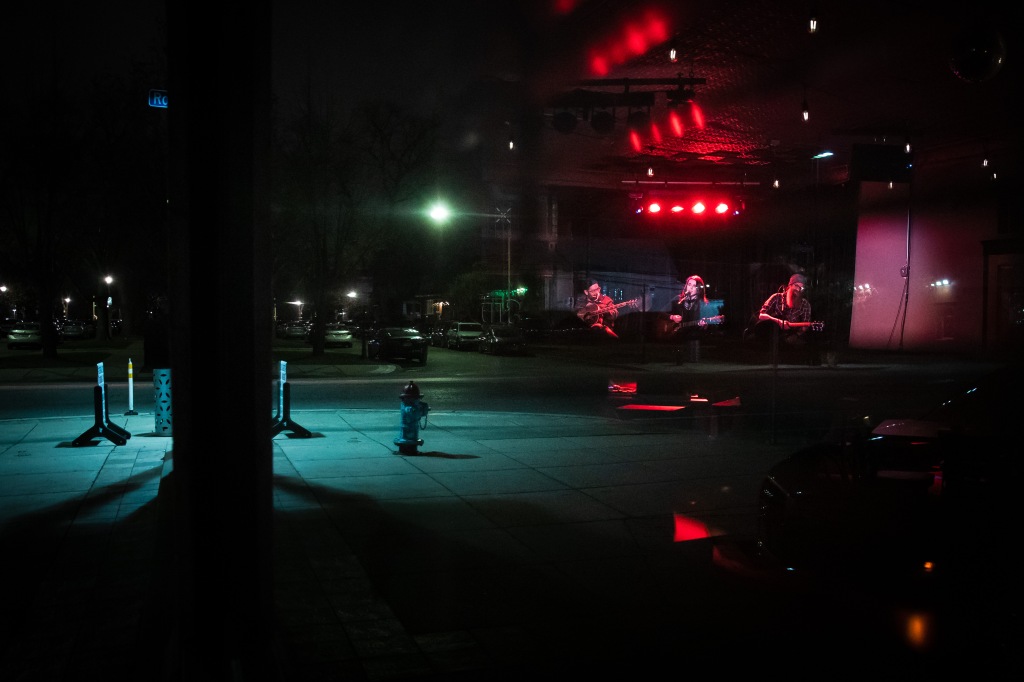It’s been quite a while since my last post. As I’ve mentioned, I really suck at keeping up with blogs. Nevertheless, here I am writing a blog post about writing. I suppose it’s like writing a song about songwriting.1
I go through long stretches without writing, and this past year has been no exception. I wrote a song back in February of 2023, and didn’t manage to write another until a couple of weeks ago. That’s a year and some change. During these long dry stretches, my internal monologue starts to run away with me: “So, is that it? Are you out of ideas? Are you even a songwriter anymore?” That’s all ridiculous, of course, but the human brain is adept at telling stories, proposing hypotheses, and filling in blanks.2
I have a pretty good idea of why I go through these droughts, though. To write songs, you need time. You simply have to have time to sit down and do it. Lately, I haven’t been giving myself that time. I’m a gigging musician who works a day job. That’s forty-plus hours a week spent working during the day and then one to three nights spent gigging. That doesn’t even factor in time with my family, other commitments, etc. A schedule like that doesn’t leave a lot of room for peaceful writing time.
Additionally, you need moments that are quiet and still enough for you to be able to hear the song in your head without life drowning it out. It’s hard to write a song when you’re surrounded by noise and bustle.
Songwriting, for me, isn’t formulaic. I can’t just carve out some time to sit down and write a song. Well, let me clarify that: I can just carve out some time to sit down and write a song. I’ve done it. The problem is that, when I do, the songs aren’t usually very good. I need to find some kind of inspiration, be it musical or lyrical, to get the process started. Otherwise, whatever comes out just ends up feeling forced and clunky.
I’m far more likely to find that catalytic inspiration when I have some quiet time in which to work.
I’ve often compared songwriting to a faucet, and if the faucet is on, or, at the very least, dripping, the songs come easier. For example, I spent several hours one afternoon working on writing Vibration, an Echo and Ransom song. As I was putting my guitar away I strummed a progression in G and realized that I potentially had something else. Half an hour later, I had written Carrying On. It felt more like something happening to me rather than something I was doing.
The faucet was already on, the water was warmed up, and a song poured out.
Getting two good songs in an afternoon is pretty great, but I’ve had other experiences where I’ve written songs that I liked after writing a song that I ended up shelving. I’ve written many songs through the years that just didn’t really resonate with me for whatever reason, so they never see the light of day. I tuck songs like that away and, maybe, strip them for parts later on. I’ve used pieces of shelved songs in other songs: chord progressions, melody, lyrics, or whatever else I can scavenge.
Even when songs don’t work, though, the act of simply going through the process of writing them has occasionally directly led to songs that did. Sometimes it happens on the same day, sometimes it’s a few days later, but when I’m in that writing headspace it’s just easier to find a song.
It’s not just songs, though. I find that, for me, writing anything helps get the wheels turning.
Lately, I’ve been grabbing a journal and writing whatever comes to mind: lyric ideas, random thoughts, or just a recap of my day. I don’t do it every day, but I believe this practice contributed to the song I wrote the other week.
Some of what I had written in these journaling sessions over the past couple of weeks were actual, word-for-word lyrics that ended up in this new song,3 although some of it was just whatever I happened to be thinking about at the moment. The content of the writing, in my experience, doesn’t matter. It’s the writing itself that’s significant. Letting thoughts, feelings, and ideas crystallize on paper gets the faucet running.
Writing begets writing.
My intention is to develop the habit of writing, or, rather, re-develop it, as I wrote quite a bit more when I was younger. I’m not necessarily committing to writing a blog post every week or to journal every day, but I’d like to do some kind of writing on a daily basis. Even if it’s just a few sentences about my day or a lyric idea.
I’m also not committing to writing a certain number of songs over the course of the year or anything like that. I want to write for the sake of writing. If it produces some new songs, that’s great, but if it doesn’t, it’s still something that serves me and is, therefore, a worthy pursuit.
It’s easy to get swept up in the idea that you need to be more productive as a songwriter. All the gigging musicians I know are familiar with the various ways to trigger an algorithm, and constantly creating new content is a way to get streaming service and social media algorithms to take note. It’s not hard to fall into this trap, but the problem with trying to keep up with the demands of the almighty algorithm is that art just doesn’t work that way. Quantity should never take precedence over quality.
As I mentioned earlier, I could get my guitar and write a song right now, but I can’t guarantee it would be any good. You can tell when aspects of a song are forced: clunky phrasing, clichés, unnecessary bridges.4 Songs have to, in a way, write themselves. The more you try to control the process, the less likely you’ll be able to follow their twists, turns, curves, and corners.
Create for your own sake and on your own timeline. Art isn’t a product. Don’t let this manufactured need to constantly create content get in the way of your art, because if you do, you’re well along your way to exhaustion and burnout.
I’m setting an intention to write, in whatever form that takes, in order to get myself in the habit of writing more. I’m not doing this because I feel like I need to create more content, but, rather, because writing is actually good for me. I feel better when I do it.

Photo by Lara Benefield.
I’ve been intentionally gigging less this year. I have a tendency to do too much, and I’ve found that having more quiet time not only gives me more energy, creative and otherwise, to write, but it also gives me more time for self-care. I burn myself out regularly, and I can’t write when I’m burned out. Like I said earlier, to write songs you need time and you need quiet. Lately, I’ve been doing my best to give myself both of those things.
In addition, I’ve been spending more time with other songwriters. I’ve done some live shows accompanying fellow local singer-songwriters, and I’ve also been doing some studio work. I enjoy playing on other songwriters’ songs because it really gives me an opportunity to crawl inside what they wrote and help them tell their story. I feel like the act of seeing their song from their perspective and, subsequently, being creative from within that perspective, makes me a better songwriter. It gets me out of ruts and it lets me play in someone else’s sandbox. I learn and I get new ideas. No matter who you are or how long you’ve been writing songs, everybody you meet has something to teach you.
I’ve also played quite a few writers’ rounds, song swaps, and other shows where songwriters have the opportunity to talk about their songs and their overall process as a songwriter. I love being a part of shows like this, not only because hearing great songs makes me want to write great songs, but also because hearing how other writers approach their craft can give me a brand new way of looking at the act of songwriting and, potentially, provide me with new tools to store in my toolbox. If one of those tools can help me overcome a bout with writer’s block, even better.5
Being around my brilliant friends and hearing them sing their songs inspires me in so many ways. I can’t really put into words what having that kind of community can do for both your art and your mental health.6

Photo by Lara Benefield.
Songwriting is, in a very real way, sacred to me. It’s a spiritual practice. It’s mystical.
It is the most effective way that I have found to truly express myself. That applies to music in general, but especially to songwriting as an aspect of that whole. I don’t take it for granted.
The times when I don’t allow myself the space to write are often long and usually frustrating. Writing songs is a steam valve. Even if the song I’m writing is purely fiction, writing still levels me out. When I finished this most recent song, I could immediately feel the impact the act of writing it had on me. It was like waking up from a good night’s sleep. It felt like I just had a good conversation with a friend.
I’ve set an intention to give myself a little more room to breathe, be, and write. If this leads to a bunch of new songs, that’s great, but that would be a happy side effect, really. The direct, appreciable benefit of writing more will be the impact it has on my mental health.
It’s not about productivity for me. Ultimately, it’s about self-care.
I have some questions for all of you writers out there:
- What kinds of things do you do to make space for yourself to get words on paper?
- What do you do to combat writer’s block?
- What has writing done for your mental health?
This is not limited to songwriters. I want to hear from anybody who writes anything, even if you what you write is for your eyes only. Drop your answers here in the comments or reach out on social media. I’d love to hear your perspective.
Happy Writing!
- Which I’ve also done, incidentally. ↩︎
- In other words: the human brain is adept at running away with you and making stuff up. ↩︎
- This type of thing has happened to me before; Lay Low, for example, was written after a freewriting session back in 2019, using some of what I had jotted down in my journal. ↩︎
- Not every song needs a bridge. Seriously. If you’ve said everything you need to say, you’re done with the song. Now, if you feel like you need something in there to break up a repetitive chord progression, but you don’t think you have anything else to say lyrically, make it an instrumental bridge. It’s better than forcing something for the sake of it. ↩︎
- Again: Everybody has something to teach you. ↩︎
- I wrote a blog post last year about this. I can’t stress this enough: Community > Competition. ↩︎

Leave a comment